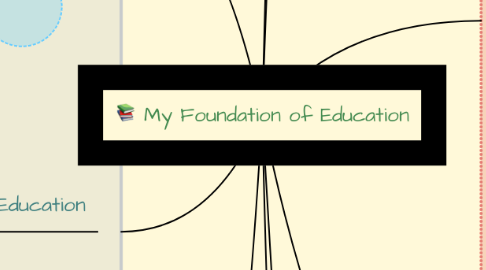
1. Politics of Education
1.1. Conservative
1.1.1. individuals are capable of solving his or her problems
1.1.2. initiative and hard work
1.1.3. Perspective: role of schools is to provide the necessary educational training to ensure that the *most hard-working* and talented individuals receive the necessary tools to maximize economic and social productivity.
1.1.4. transmitting cultural traditions through what is taught (the curriculum).
1.1.4.1. also broadening cultural awareness of perspectives and values and increasing respect for all
1.1.5. role of school essential to both economic productivity and social stability
1.1.6. schools socialize children into the adult roles necessary to maintain social order
1.2. Traditional
1.2.1. Passing on the importance of hard work, respect, integrity, family, and initiative in order to positively influence today and tomorrow, for one and for all.
2. History of U.S. Education
2.1. 1837 Horace Mann's reform to prepare teachers to be effective educators
2.2. 1945 Brown v. Board of Education
2.2.1. Over turned Plessy v. Ferguson and ruled that separate was not equal and segregation is unconstitutional.
2.2.2. Paved the way for inclusion despite, race, gender, and ability.
2.3. 1975 Individuals with Disabilities Education Act
2.3.1. One of the first steps to recognizing the growing need to assist students with special needs and include them in society instead of iscolate them.
3. Sociological Perspectives
3.1. Functional Theories
3.1.1. Interdependence of the social system-- society is a "machine" where one part articulates with another to produce the dynamic energy required to make society work.
3.1.2. Appropriate moral values and cohesion is the foundation of society
3.1.3. Education reform is to create structures, programs, and curricula that are technically advanced, rational, and encourage social unity
3.2. Effects of Schooling on Individuals
3.2.1. Knowledge and Attitudes
3.2.1.1. More years of schooling leads to greater knowledge, social participation, sense of well-being, and self-esteem
3.2.2. Greater Employment Opportunity
3.2.3. Education and Social Mobility
4. Philosophy of Education
4.1. Pragmatism
4.1.1. "By their fruits ye shall know them."
4.1.2. "What will work to achieve my desired end?"
4.1.3. Progressive- educators start with the needs and interests of the child in the classroom, allow the child to participate in planning his/her course of study, employ project method or group learning, and depend heavily on experimental learning
4.1.4. Aim of education is: GROWTH, lifelong-learning
4.1.5. Inspire human beings to live life to the fullest, continually add to the quality and meaning of their experience and their ability to direct that experience, and participate actively with their fellow human beings to build a good society.
4.1.6. Teacher is facilitator
4.1.7. Children learn both individually and in groups through problem solving and inquiry methods.
4.1.8. integrated curriculum that "expands the environment" and balances traditional disciplines with the needs and interests of the child.
5. Schools as Organizations
5.1. During the past 80 years schools in the United States have consolidated so that education is more cost effective and efficient.
5.1.1. Centralization and consolidation of schools
5.1.1.1. negative impact: schools have become less diverse, more bureaucratic and less democratic
5.2. Decentralized school system
5.2.1. each state maintains its autonomy, authority, and responsibility regarding education. The federal gov't has very little input regarding individual schools.
5.3. Bureaucratic in nature
5.3.1. "....endeavor to organize human behavior in order to achieve specific goals" -Weber
6. Curriculum and Pedagogy
6.1. Functionalist theory of curriculum
6.1.1. Schools teach students general norms, values, and knowledge that is essential to a modern society
6.1.1.1. respect
6.1.1.2. achievement
6.1.1.3. competence
6.1.2. role of schools is more about teaching students how to learn rather than what to learn.
6.1.2.1. adaptability
7. Equality of Opportunity
7.1. Students with Special Needs
7.1.1. 1975, All Handicapped Children Law (EHA) Children with special needs were properly identified and placed in appropriate classes, defined as "least restrictive environment."
7.1.2. Regular Education Initiative (REI), inclusion into regular classroom
7.1.3. Need of flexible system for students with special needs- not an uniform decision where "One-size-fits-all"
7.1.4. The vast majority of children labeled with special needs can be better served by being mainstreamed into the general ed. classroom
7.1.5. Over-labeled (ADHD and ASD, especially)
8. Educational Inequality
8.1. School-Centered Explanation
8.1.1. School Financing
8.1.1.1. combination of revenues from local, state, and federal sources: majority being from state and local taxes-- property taxes
8.1.1.1.1. Property taxes are based on the value of property in local communities and therefore is a proportional tax.
9. Educational Reform
9.1. Charter Schools
9.1.1. public schools that are free from manyh of the regulations applied to traditional public schools, and in return are held accountable for student performance
9.1.2. First- Minnesota 1991
9.1.3. Charter- performance contract; formal, legal document between those who establish and run a school and the public body that authorizes and monitors such schools.
9.1.4. They produce the results they think are best, for charter schools are self-governed institutions with wide control over their own curriculum, instruction, staffing, budget, internal organization, calendar, etc.
9.1.5. advocates believe that, freed from bureaucratic constraints of traditional urban public schools, charter schools will provide a better education at a lower cost.
9.1.6. questionable achievement difference
